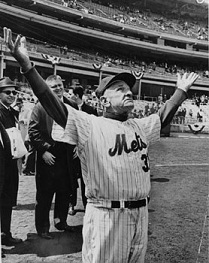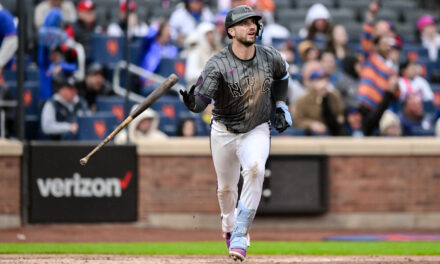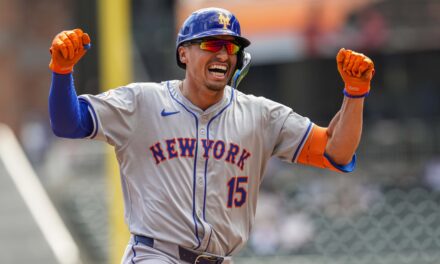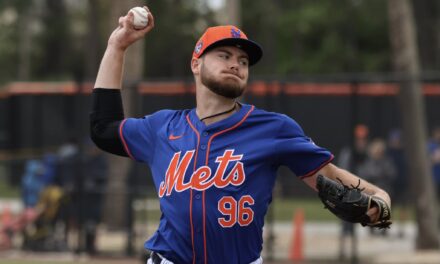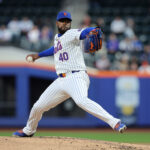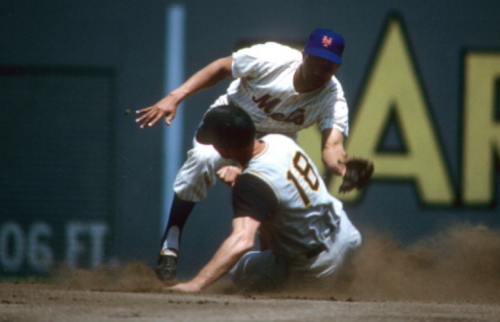
In the 1963 NL Rookie Of The Year voting, the top two players were both second basemen – Pete Rose of the Reds who won the award, and Ron Hunt of the Mets who finished second in the voting. Neither had been expected to even make it to the big leagues that season. Rose had just finished a great season in the minors, but it was at Class A Macon.
Hunt was a conditional purchase from the Braves after a good season in the Texas League. Going into the 1963 season, veteran Don Blasingame was the incumbent for the Reds and Larry Burright, who had just come over from the Dodgers was expected to win the Mets’ second base job.
In 1964, Hunt surpassed Rose (very temporarily) when he was voted as starter on the NL All-Star team which was played at Shea Stadium. Hunt had an outstanding year, finishing the season batting .303 with a .763 OPS, and being named the second baseman on the post-season Sporting News All-Star team as well.
But Hunt and Rose remain forever linked for another less-remembered reason. Despite their great rookie years, both were briefly supplanted by Bobby Klaus.
Klaus had been the All-Star second baseman in the Pacific Coast League and certainly seemed ready for the majors, but the Reds weren’t yet prepared to move Pete Rose to another position. Klaus had a reputation as a great defensive second baseman and a decent hitter.
 Rose began the 1964 season struggling to get his average above .220, so the Reds gave Bobby Klaus a brief shot at the job. But on June 27th and 28th, Rose had 8 hits in 9 at-bats, raising his average from .214 to .240 and although he did go back into a slump for a while, it was clear that the Reds were sticking with Rose.
Rose began the 1964 season struggling to get his average above .220, so the Reds gave Bobby Klaus a brief shot at the job. But on June 27th and 28th, Rose had 8 hits in 9 at-bats, raising his average from .214 to .240 and although he did go back into a slump for a while, it was clear that the Reds were sticking with Rose.
Meanwhile, Klaus still seemed like a pretty good prospect. Now, the Mets of 1964 certainly needed all the help they could get. But if there was one spot that seemed to be in good hands, it was surely second base.
Yet less than two weeks after Ron Hunt started the All Star game, the Mets purchased Bobby Klaus from the Reds, immediately installed him at second base, and moved Hunt (who had played some third base in the minors) over to third. I’m not sure how Hunt took this, but to Met fans it seemed like a pretty half-baked move at the time. In other words, it didn’t go over very well.
As fate would have it. the experiment lasted about a week, at which time, Hunt was moved back to second and Klaus slid over to third. Even though he hit around .220, pretty bad no matter how good his defense may have been, Klaus hung around for another season and filled in when Ron Hunt suffered through an injury-filled season in 1965. But Klaus was eventually dealt away when Hunt returned.
Bobby Klaus had a fairly brief and undistinguished major league career, but in one season he was given a shot to replace both Pete Rose, who of course, went on to become baseball’s all-time hit leader, and Ron Hunt, the Mets’ All Star second baseman and their best and most popular player of that era.
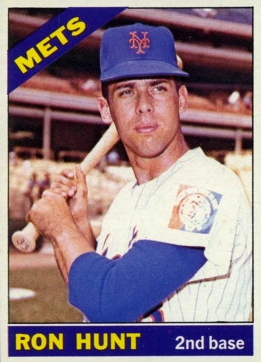 After another All-Star campaign in 1966, the Mets surprised everyone when they dealt the 25-year old Hunt and outfielder Jim Hickman to the Los Angeles Dodgers for outfielder Tommy Davis.
After another All-Star campaign in 1966, the Mets surprised everyone when they dealt the 25-year old Hunt and outfielder Jim Hickman to the Los Angeles Dodgers for outfielder Tommy Davis.
Hunt would go onto have his most productive seasons as he entered his prime, posting 4.6 and 4.1 WAR seasons with the San Francisco Giants and 5.1 and 3.6 WAR seasons with the Montreal Expos.
A St. Louis native, Hunt became one of the toughest outs in the National League for almost a decade. After striking out 5o times in his rookie season, he would never hit that mark again, becoming one of the best contact hitters of his era.
And even in his final major league season, Hunt struck out just 19 times in 513 plate appearances with a .372 on-base percentage. He finished his career with just 382 strikeouts in 6.172 plate appearances.
Of course, what Ron Hunt will always be remembered for is his uncanny penchant for being hit by a pitch. He still holds the modern major league record for being hit 50 times by a pitch in 1971. Hunt made a career out of getting hit, finishing with 243 HBP in his career.
Overall, Hunt had himself a solid career finishing with a .273 average, a .369 OBP and .715 OPS while accumulating a 32.7 WAR in 11 seasons. Unfortunately, most of that production came after his time with the Mets. But Hunt will always have a special place in the hearts of all Mets fans who saw him play… He was our very first genuine star.
